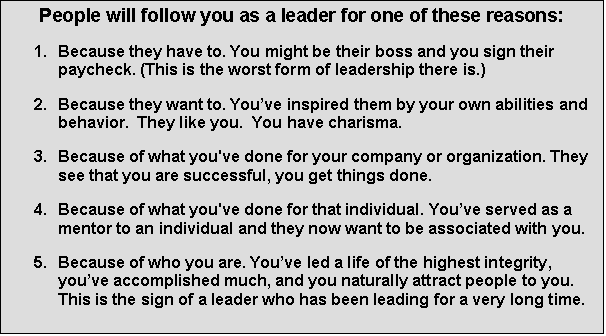Life Coaching Leadership Training
A life coach needs to be a leader of the highest caliber. You will have clients who need to learn what leadership is about. You will have to help them recognize good leader role models in their lives to use as examples.
Learning about leadership is critical to your development as a life coach.
Without leadership qualities, how can you possibly hope to have your clients look to you for direction? You will learn the following about leadership:
o Everyone is a leader at least some of the time.
o There is no such thing as a born leader. It is a skill that can be learned, developed, and honed.
That dispels two of the biggest myths about leadership.
Leaders are created, not born. Anyone can be a leader. It is a choice.
Some people intuitively learn leadership skills, mostly because they grew up with someone who provided a great leadership model. The rest of us need to find a role model to help us on our journey to becoming a leader.
A leader is one who has developed a following of people who are attracted to that leader for one reason or another.

Perhaps you are an effective leader, you get things done, and people like to be aligned with someone who gets results.
Still others will follow you because of the example you have set for them. Perhaps you have mentored them and they see the personal growth they have achieved because you have inspired them to become better. The best leader is one who incorporates all good values into a leadership style.
Each form of leadership almost can be seen as a stair step, with each step leading up to the next level of leadership.
How to Develop a Following
You need to be able to establish and handle priorities. You know how to focus the greatest amount of your effort on the most important things in your life.
As has already been established, you must live your life with integrity. Every time you speak with a coaching client, you must embody the integrity you are trying to teach them about. People can see through you if you are false or a hypocrite. No other occupation requires such a great amount of personal integrity as being a life coach. Your clients will hold you accountable!
As a leader, you must be able to inspire your clients to change. Change is necessary for progress and yet most of us prefer to keep things as they are. Persuading your clients to change will be your job's greatest challenge. If you, personally, are not growing and changing, it will be especially hard to convince your clients to change.
Another leadership quality your clients will appreciate will be your ability to solve problems. Remember to maintain a positive attitude and be sure to model this for your clients. Poor attitudes will cause a problem-solving tactic to blow up in your face.
Remember our discussion about attitude. While you cannot always control what happens in your life, you can control your response to it. This is where you will be an example to your client. If you spend the first 10 minutes of your coaching session complaining about how you hit every red light on the way, you will be modeling a negative attitude.
If you greet your client in an upbeat manner, projecting the feeling that anything is possible, you will be modeling a positive attitude. In this way, you are a leader. Modeling appropriate behavior is critical to your success as a life coach.
The next leadership quality you will bring to your life coaching career is the ability to have vision. You will need this to encourage your clients to accomplish their goals. Help your clients learn to avoid the following impediments to their vision:
o Allowing previous failures to prevent trying again.
o Fear of failure.
o Selfish goals that do not look beyond themselves.
o Fear of ridicule.
o Fear of being different.
o Bad behavior due to habit or tradition.
o Complacency.
o Dreams that are not big enough.
For both you and your client, you will want to prioritize behaviors that need to change and then work on them one at a time.
How to Criticize
This is a really tough area for most people. As a life coach leader, it is one you must master because, while you are to be a safe person, a sounding board, and a source of infinite encouragement for your client, you also will have to redirect your client without causing offense in order to help the person grow.
Your goal will be to help clients, not humiliate them. You will want them to be willing to make a change without undermining their self-confidence. Avoid "always" and "never" statements, as in "You always _______," or "You never _________." One manager states: "There is no such thing as 'always' and 'never'; there is no such thing as absolutes in human behavior."
Be sure to focus on the problem and not the person. Choose your timing carefully. Put yourself in your client's place before saying something. Have you been successful at what you are asking your client to do? What you ultimately want for your clients is to take your criticism and fly with it, learn from it, and make something in their lives better because of it.
Start with some words of praise and be sincere. This relaxes your clients, and your sincerity gives them confidence to face what comes next.
Whenever possible, ask questions. Rather than coming out with a declarative statement about a behavior, ask questions. When your clients come to the correct realization about themselves in this way, they do not feel threatened.
One young woman was being coached on how to make better progress in her home-based business. Her coach was helping her set goals. After a week of reflection, the client came back and stated that her goal was to organize and paint her office.
Now, her coach was looking for goals more like making more phone calls, attending networking meetings, things that would put money in her client's pocket. Despite feeling frustration, the coach chose to ask questions rather than condemn or criticize the goal of organizing and painting the home office.
The coaching session went something like this:
Coach: How did your goal-setting plans go this week?
Client: Great! I decided to organize and paint my office. I want to be able to find things and I want to feel comfortable in my working environment.
Coach: That sounds like a legitimate goal. Have you written down obstacles and action steps?
Client: (Here the client lists obstacles of procrastinating, getting paint chips, and having to work around her husband's schedule, as she believes she needs his help with this activity.)
Coach: So, it sounds as if this project may take two to three weeks to accomplish. Let me ask you a question: How will working on this goal put money in your pocket this week? I know you'll enjoy working on this goal to organize and paint your office; and I believe that you can focus on two goals at once, perhaps one for the organizational aspect of your life and one for the building business part of your life.
Client: I hadn't thought of that. I'd like to do something to put money in my pocket. Should I not focus on my office plans?
Coach: Getting your office organized and more comfortable will definitely make working there more pleasant, so let's have you proceed with that goal. Now we want to focus on money-making activities for your business as a second goal.
Client: That sounds great. So, I can work on more than one goal at a time?
Coach: I like to limit goals to about three, where you work on one goal at a time in three areas of your life. I believe that you can easily manage working on both of these goals at the same time. Let's brainstorm some ideas to help you establish a money- making goal for your business.
How to Make Criticism Seem Like a Good Thing
It is time to offer you a challenge.
Learning to criticize without offense is a rare skill, and it is one that can be learned. Your job this week is to criticize people constructively without making them feel put down or frustrated.
How will you do that?
You will change one three-letter word for another three-letter word. You will eliminate the word "but" from a compliment and exchange it for the word "and."
The coach could see that her client actually was looking forward to organizing and redecorating her home office. Most of us really do feel good when our working environment is pleasant. It was easy to compliment this choice.
Notice, however, the very next word: "and."
"I believe that you can focus on two goals at once, perhaps one for the organizational aspect of your life and one for the building business part of your life."
Let us break this portion down, putting in the destructive three-letter word "but":
"I know you'll enjoy working on this goal to organize and paint your office, but I believe that you can (should is implied) focus on two goals at once, perhaps one for the organizational aspect of your life and one for the building business part of your life."
What happens to the tone of this statement now?
It becomes a criticism. The tone is judgmental. Had the coach used this version, the client would have become hurt and defensive. She could have felt betrayed as soon as she heard the word "but." The client will feel inadequate, unsuccessful, and unwilling to try.
Notice the next time you try to criticize someone. We often add the word "but" after the compliment, which essentially negates our compliment.
You might just as well have gone for the throat and criticized because once our brain hears the word "but," we know that the compliment was insincere.
Remember: One single word, "but," can cause a lot of damage. Another three-letter word, "and," can become empowering.
































